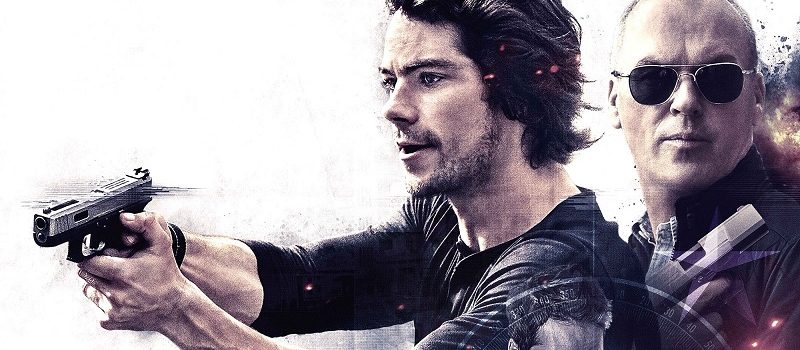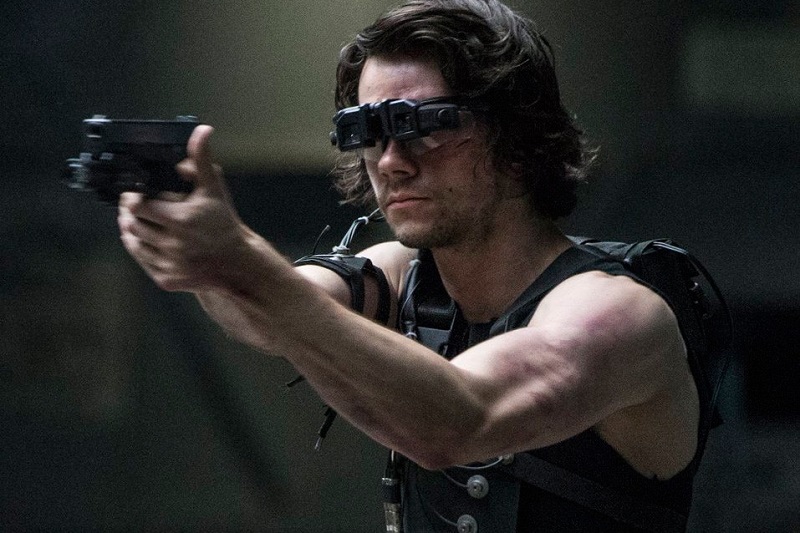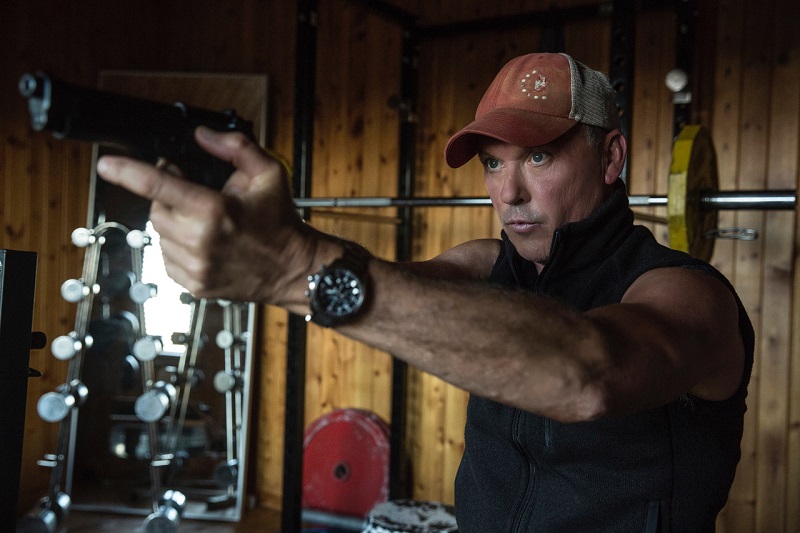Dylan O’Brien is the American Assassin. The film is storming into theaters with the Teen Wolf and Maze Runner star portraying the title character. It’s not that simple. He is not just recruited into the CIA has a highly trained killer. He has a tragic backstory that finds his fiancé gunned down in front of him by terrorist that sends his life into turmoil as he becomes obsessed with tracking down those who committed these heinous acts and making them pay the ultimate price.
As he gets close to joining the terror cell that organized those horrific acts, O’Brien’s Mitch Rapp catches the attention of the CIA and they believe they can channel his anger, coach him and turn him into America’s next great highly trained killer in the war to stop terrorism in our time. Michael Keaton portrays his mentor, Stan Hurley, and the two get on like gangbuster in a cinematic chemistry that is as strong as it was on the pages of Vince Flynn’s 15 novels.
We caught up with O’Brien and Keaton and the two traded compliments on each other, what they learned from one another and how the politics of American Assassin had the veteran actor challenging his screenwriter and director to make these characters not exist in a black and white realm, but one that is firmly and grimly grey.
Q: Michael Keaton, when it comes to politics, you’re pretty clear on what you believe in. How was participating in American Assassin challenge you in that realm?
Michael Keaton: It was a concern, actually. I was a little nervous about how it leaned, frankly. I’m not one thing or another. I don’t really think most people are one thing or another. In terms of the terrorism issue, I would call myself a hardliner, to say the least, but maybe not so much in other areas. So I was okay with what the goal was in the books and in the movie. That said, Dylan and I, one of our main concerns when we first read the script or were talking about making this movie, was that it wasn’t [a] simplistic black and white. To Michael (Cuesta, director) and Stephen’s (Schiff, screenwriter) credit, and whoever else was involved, they not only took our notes but I think Michael was a step ahead of us. What I thought he did, he created nuance. People who don’t really have a philosophical or religious stake in things makes it more interesting. They really did a good job of making it a little more complicated, more interesting, not as clichéd. It was more palatable to me once they accomplished that.
Q: The torture scene, did that make you feel at all one way or another on the political spectrum in terms of what our nation should be doing or, simply, is this a piece of fiction and you just went for it?
Michael Keaton: Well, there’s that too. [Laughs] I love the way you ask me and go, “Yeah, right.” Yeah, there’s a scene where I torture a guy in the trunk of a car.
Q: Dylan, is it hard to wrap your mind around a guy so enraptured by anger and revenge? Dylan O’Brien: The way I always thought about it was he’s obviously consumed by those kinds of things, immediately in the aftermath of what he goes through, his whole life getting flipped upside down. Part of the arc of his character that I always loved was that kind of learning curve. He always thinks the revenge factor, the vengeance will be the answer and that’ll ultimately be what heals him. I think a big thing for me with his arc is that he has to learn about himself that this thing he went through is never going to leave him. It’ll always be a part of him and nothing’s going to wipe it away. I think when he goes through that, he ends up seeing this other side of it where he can be an asset for his country and can kind of protect this from happening to other people. Ultimately, I think he realizes that he’ll have to learn how to cope with this, learn how to live with this thing the rest of his life, but serve and protect. That’s the right answer.
Q: Your Arabic was impressive in American Assassin.
Dylan O’Brien: Don’t be too amazed by it. It’s one of the most difficult things I’ve ever had to do for a movie. Going into it you always think too that you’ll be spending months on it. Whenever you see other people doing that kind of thing in a film, you’re like, “I gotta probably get started on that now.” I think we were in preproduction at one point and I was like, “When am I doing a dialect session?” So it was challenging to try to get down at the last minute — even though obviously he’s not fluent in Arabic. The idea that we sculpted into the film is that we thought it’d be cool to add he taught this to himself as part of his mission in this past year and a half. I thought that was a cool thing, enough so to believably infiltrate these terrorist cells. I didn’t have to be perfect with it but I still wanted to be pretty damn good with it because it had to be viable that this guy was being trusted by these people. It was tough. I worked with several coaches. Whoever we could get to set on the days that I had to do it and always just tried to practice as hard as I could and had them record on my phone a little bit. I recorded them saying it so I could always have it in my ear, in my head and try to get a good ear from it. That’s about it.
Q: Did you each learn something from each other?
Michael Keaton: You know, I don’t believe in you only learn from older people. If somebody’s got something good to say, I don’t care if they’re 10 years old, I just pay attention. Dylan has a really good work ethic. I was reminded that that’s what you should do. A lot of times you have to mature into that. Since he and I are in the most scenes together, I gotta say we laughed a lot. He’s a pretty fun dude.
Dylan O’Brien: I think the biggest thing I can take away from working with Michael was working with someone who I’ve been watching as an iconic figure since I was a little kid. It’s even more so iconic when that’s how you were first introduced to somebody. They’re kind of always printed like that in your head in a way. Then working with a guy who’s been doing it for so long, and then when you meet him, he’s a cool, normal, smart guy who does the work and goes home. That’s ultimately the biggest thing I can take away from it. I’m still young in this industry and I’m still working my way up, working with guys who’ve been doing it forever, since before I was born. To see that a guy who has had this long career and is still, I’m sure, the same cool guy that he always was…
Michael Keaton: Cooler, actually.
Dylan O’Brien: He’s just gotten even cooler. That’s what I took way.



